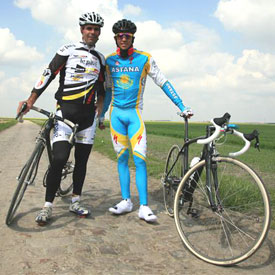Four-time Grand Tour champion feels for Andy, but wasn’t about to wait around
 Rightly or wrongly, it is fair to say that Andy Schleck’s mechanical on the Port de Bales, simultaneously accompanied by Alberto Contador’s strong acceleration around his faltering figure, will be one of the lasting images of this Tour de France.
Rightly or wrongly, it is fair to say that Andy Schleck’s mechanical on the Port de Bales, simultaneously accompanied by Alberto Contador’s strong acceleration around his faltering figure, will be one of the lasting images of this Tour de France.
The move has sparked a huge wave of controversy. Following the boos and hisses from the gathered crowd as Alberto Contador donned the yellow jersey for the first time in the 2010 Tour de France, the native of Pinto, spoke about how he saw the situation in the post-race press conference. The four-time Grand Tour champion states some fair points, and makes a solid effort to take a look back at the Saxo Bank team during the first week – they were no saints either.
“I understand that it is a difficult situation, but it will not win the Tour de France. At the stage in Spa, I told my teammates to wait for the Schleck brothers, Frank and Andy, without knowing what the guys in the front would do. Then, in the stage with the pave, Andy did not stop after the fall. It is a fact of racing, and it could happen again tomorrow. At this point, I do not think those 30 seconds will win the Tour.”
For Contador, the first week was a sticking point, and one that left him feeling no obligations to stop. Contador clearly points out that he had his teammates wait for Contador on the stage to Spa, while Schleck clearly did not wait for anyone to rejoin the group following his brother Frank’s crash on the cobbles of Paris-Roubaix.
“There are people who understand, and people who don’t understand. It was a circumstance of the race. I knew it was going to create controversy. When I attacked, I did not know he had a mechanical problem. I understand some do not agree, but when I was at the front, the race was on. We had already stopped once in Spa: it was more serious there.”
It is interesting to see how Contador portrays the incident though. At some points, he says he had no idea, but then he notes moments later that he knew the incident would create controversy. That does not imply ignorance.
“I went in with the idea of attacking. I like to take the responsibility. I was at the back of the group for awhile, but it took me awhile to get loose. I wanted to attack towards the top. When I launched the attack, I was not aware of the problems. I learned of those later. In any case, I did not know how much time he lost trying to sort out his chain.”
The new yellow jersey wearer, Contador, was asked if he would have preferred to take the yellow jersey under different circumstances. Contador replies to the contrary and was more than happy with the day – yellow jersey and time on Schleck? Perfect.
“To take the yellow jersey and take time on other riders – that’s a good thing. Whatever the circumstances, it is good. Today, we could not do like we did at Spa.”
Contador was taken to task when asked if he considered waiting for Schleck once he was made aware of the situation. The podium finisher at this year’s Fleche Wallonne wasn’t interested in bearing the burden of that decision on only his own shoulders though, because he was in a group of hard working riders, including Menchov and Sanchez.
“I do not know what the other riders knew. After that, I wasn’t alone. Everyone rolled through in the front to pull away. For me, it makes no difference for the final ranking. I will continue to be concentrated and watch the other racers.”
Contador had some fair words to say in Bagneres du Luchon. There will be many tonight that do not agree with his actions, but it is a difficult thing to explain when the pave stage is brought to the fore. Where is the line in the ethics drawn? Does it only apply in the mountains? Does it apply in the Ardennes, but not the cobbled pathways of northeastern France? Does it apply to the superstar contenders to yellow in the first week, or does it apply to all contenders for yellow? It’s a personal decision by each rider on each day, and that’s just how it is.
Like it or not, you can proclaim the sanctity of the yellow jersey from the highest mountain, but at the end of the day, there’s a race to be won. If a rider stands true to the so called rules of the Yellow Jersey, that’s great, but if he doesn’t, that’s a choice that can also be made. Fans and pundits can choose to disagree, and Schleck himself can say he’d never do that, but if the race continues while you’re on the side of the road, there’s nothing left to do but get pissed off and take it out on the Tourmalet over the coming two stages.